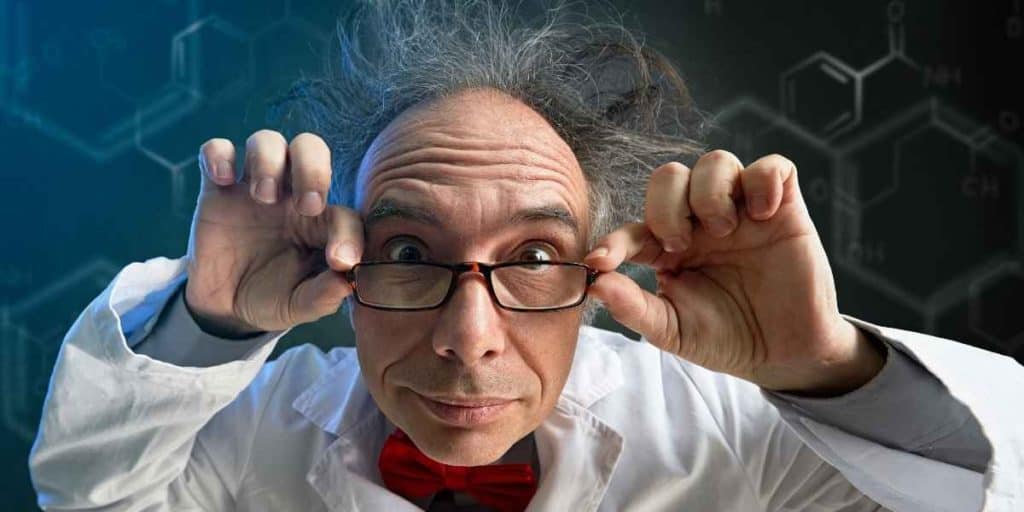Data science trends as an attractive career with lots of opportunities to find work and make good money. But is it a real science? And if it is, what kind of science courses does a person have to take?
Data scientists are really scientists, but it depends on how science is defined and their field. Although data scientists use the scientific method to solve problems, they perform roles similar to researchers, analysts, or consultants in many situations.
To answer the question about data scientists, we first need to agree on what we mean by science. Afterward, we can examine what a data scientist does and decide whether it is actual scientific work or something else. Read on to find out!
Important Sidenote: We interviewed numerous data science professionals (data scientists, hiring managers, recruiters – you name it) and identified 6 proven steps to follow for becoming a data scientist. Read my article: ‘6 Proven Steps To Becoming a Data Scientist [Complete Guide] for in-depth findings and recommendations! – This is perhaps the most comprehensive article on the subject you will find on the internet!

Table of Contents
What Is Science?
This seems like a silly question. Everybody can agree on what science is, right?
Not exactly.
Science is a process of using observation, creating explanations, and using them to make predictions. However, disagreements begin when people describe what is being observed. For example, a checklist from the University of Berkeley says that science “focuses on the natural world.”
And what is the natural world? According to Merriam Webster, the natural world is “all of the animals, plants, and other things existing in nature.”
But other sources tell us that science has four branches:
- Mathematics and logic—the science behind abstract concepts.
- Biological science, or the study of living things.
- Physical science, which is the “other things existing in nature,” everything from chemistry to astronomy.
- Social science—the study of societies and how people interact with them.
This definition expands science. According to the first definition, anything related to the social sciences is not science, meaning subjects such as anthropology, sociology, and economics would not be considered science. So data science would not qualify.
But under the second definition, it might.
What People Agree On?
Not everyone agrees on what is a science, but there is more agreement on the scientific method. Scientists use this set of procedures to determine how things work:
- Observation/Problem
- Form a hypothesis
- Test the hypothesis
- Analyze the Results
- Arrive at a conclusion
Although this is an oversimplification, most people agree that a scientist comes up with a theory to its cause and then tests the theory and analyzes the results in a quest to understand a situation or problem.
So then, do data scientists follow these steps?
What Does a Data Scientist Do?
Data scientists work in various fields, including science, academic, business, government, and computer science. Their field determines some of the work they will do.
Scientific Research
When working in research, a data scientist helps researchers to make sense of massive data. For example, gene sequencing has allowed researchers to create large databases of people, their diseases, and how the diseases and genes are related. However, geneticists need people to help them organize the data, and they call on data scientists to do so.
You could compare them to assistants who work in laboratories.
Academics
Data scientists working in academia study how data, statistics, and computer science work together. They develop methods for using data science, such as working with machine learning, work with other researchers, and teach.
Much of the work they do is with other data scientists, but they also publish papers with scientists in other fields.
Perhaps we could call them researchers instead of scientists in this field.
Business
Businesses need help in managing the massive amounts of data they have access to. Some estimate that 80% of a business’s data is not organized so that companies know what to do with it.
Data scientists examine past performances, compare a business’s results to the competition, do market analysis, and make predictions about improving sales and operations. They can also use the sales or responses to services to refine the business’s practices further.
Due to the sheer volume of data, companies are increasing their reliance on computer intelligence.
In this context, a data scientist fulfills a similar role to a consultant or analyst.
Government
Data scientists working in government perform similar functions as they do in business, except they help governmental agencies perform their duties.
- Agencies want to detect fraud and waste and prevent it from happening.
- Sensitive data and cybersecurity are essential to citizens, infrastructure, and protecting cyberspace from foreign influence.
- The military needs data to protect soldiers, track procurements, and make improvements to defense systems.
Since the roles data scientists play in government are like those in the business world, we could also call them consultants or analysts.
Computer Science
Data scientists, especially in larger firms, often consult computer scientists to gather data more efficiently. For example, larger businesses often need an Application Programming Interface (API) so that the applications a business uses or develops can communicate with other applications.
In smaller firms, both roles might be filled by one person. Perhaps in this example, a data scientist works in a supporting role to let the computer scientists know that what they created works.
Skills Data Scientists Need to Have
The skills a data scientist needs comprise technology, data, and analysis.
- Technology. Data scientists want to know if computers can learn to perform tasks they have not been programmed to do. To do so, data scientists investigate how computers use data without human intervention or machine learning. An example of machine learning is Netflix or Amazon recommendations.
- Data. Data must be gathered, converted into a format that people can understand. Often data scientists use visual tools to help people realize what the data means.
- Analysis. Data also needs to be analyzed. A data scientist looks at the gathered data, analyzes it for patterns, and works with others to determine what it means.
Although many data scientists get a degree in statistics or computer science, programs that specialize in data science better prepare someone for that field.

What Do You Need if You Want to Be a Data Scientist?
Data scientists also need skills related to the field they will work in. These might include things such as:
- Machine learning.
- Java and other programming languages.
- Software products are specific to data management, such as those made by SAS or Hadoop.
- Deal with data. Data must be sifted through (known as mining). And a database system needs to be created to store the data (known as data warehousing).
Also, a data scientist needs to be continually updating their computer and analytical skills.
How Does Someone Become a Data Scientist?
There are essentially three routes to becoming a data scientist: get a degree, change careers, or teach yourself.
- Get a degree. More colleges and universities are granting degrees in computer science. Options include online or the more traditional college experience. Those with a B.A. in statistics, mathematics, or computer sciences often earn a Master’s in Data Science.
- Change careers. People working in computer science, statistics, and data analysts often become data scientists by taking on the position.
- Teach yourself. Some people teach themselves data science by doing data science. Because this field is changing, a degree is not necessary to get many data science jobs. Take a coding Bootcamp. Create your own data sets. Find others to work with and learn from, using Meet-Ups or sites like Kaggle.
Consider your current situation and personality when deciding what route to take.
Author’s Recommendations: Top Data Science Resources To Consider
Before concluding this article, I wanted to share few top data science resources that I have personally vetted for you. I am confident that you can greatly benefit in your data science journey by considering one or more of these resources.
- DataCamp: If you are a beginner focused towards building the foundational skills in data science, there is no better platform than DataCamp. Under one membership umbrella, DataCamp gives you access to 335+ data science courses. There is absolutely no other platform that comes anywhere close to this. Hence, if building foundational data science skills is your goal: Click Here to Sign Up For DataCamp Today!
- IBM Data Science Professional Certificate: If you are looking for a data science credential that has strong industry recognition but does not involve too heavy of an effort: Click Here To Enroll Into The IBM Data Science Professional Certificate Program Today! (To learn more: Check out my full review of this certificate program here)
- MITx MicroMasters Program in Data Science: If you are at a more advanced stage in your data science journey and looking to take your skills to the next level, there is no Non-Degree program better than MIT MicroMasters. Click Here To Enroll Into The MIT MicroMasters Program Today! (To learn more: Check out my full review of the MIT MicroMasters program here)
- Roadmap To Becoming a Data Scientist: If you have decided to become a data science professional but not fully sure how to get started: read my article – 6 Proven Ways To Becoming a Data Scientist. In this article, I share my findings from interviewing 100+ data science professionals at top companies (including – Google, Meta, Amazon, etc.) and give you a full roadmap to becoming a data scientist.
Conclusion
Whether you think a data scientist is a real scientist depends on your definition of science and what you think a scientist does. People who research ways to improve data collection and statistics are more closely connected to scientific work.
People who work with businesses or governments are problem solvers who function more as consultants or analysts.
Ultimately, you must decide if it’s more important to be called a scientist or whether you want to solve problems related to the fields you read about.
BEFORE YOU GO: Don’t forget to check out my latest article – 6 Proven Steps To Becoming a Data Scientist [Complete Guide]. We interviewed numerous data science professionals (data scientists, hiring managers, recruiters – you name it) and created this comprehensive guide to help you land that perfect data science job.
Affiliate Disclosure: We participate in several affiliate programs and may be compensated if you make a purchase using our referral link, at no additional cost to you. You can, however, trust the integrity of our recommendation. Affiliate programs exist even for products that we are not recommending. We only choose to recommend you the products that we actually believe in.
Recent Posts
Data science has been a buzzword in recent years, and with the rapid advancements in artificial intelligence (AI) technologies, many wonder if data science as a field will be replaced by AI. As you...
In the world of technology, there's always something new and exciting grabbing our attention. Data science and analytics, in particular, have exploded onto the scene, with many professionals flocking...
